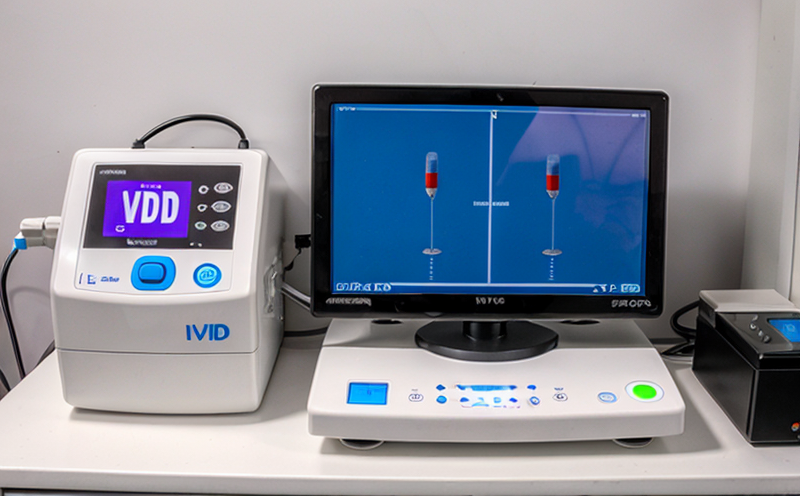CLSI EP25 Evaluation of Stability of IVD Reagents
The CLSI (formerly known as NCCLS) EP25 guideline provides a standardized method to evaluate the stability of in vitro diagnostic (IVD) reagents. This evaluation is crucial for ensuring that medical devices continue to perform reliably over their intended storage and usage conditions, thereby maintaining patient safety and healthcare quality.
The CLSI EP25 testing protocol is designed to assess the stability of IVD reagents under various environmental conditions such as temperature, humidity, light exposure, and shelf life. This evaluation helps manufacturers ensure that their products meet regulatory requirements for performance accuracy and precision over time.
During this test, samples are subjected to different storage conditions according to predefined protocols established by CLSI EP25. These conditions typically include variations in temperature (e.g., 4°C, room temperature, -20°C) and relative humidity levels. Specimens undergo regular testing throughout the duration of the study to monitor changes in reagent performance.
Testing can be performed using either a batch or accelerated aging approach depending on the specific requirements set forth by regulatory bodies like the FDA or EMA. Batch testing involves evaluating each batch produced during manufacturing while accelerated aging simulates long-term exposure conditions more quickly through elevated temperatures and humidity levels.
The results from these tests are then analyzed against predefined acceptance criteria outlined in CLSI EP25. Compliance with these standards ensures that manufacturers can confidently market their products as stable and reliable within the specified shelf life periods.
Our laboratory adheres strictly to all current versions of relevant standards including ISO 17025 for proficiency testing programs, ISO/IEC 15195-2 for IVD reagents, and CLSI EP25 itself. We employ state-of-the-art equipment capable of accurately measuring minute changes in analyte concentrations resulting from aging or other factors.
Our team comprises experienced professionals who understand the nuances involved in performing this type of evaluation. By leveraging our expertise combined with advanced technology, we provide comprehensive reports detailing every aspect of the stability assessment process.
In summary, the CLSI EP25 evaluation is a critical step towards ensuring product quality and compliance with regulatory requirements. It helps manufacturers maintain confidence in their products' performance throughout their lifecycle.
Eurolab Advantages
At Eurolab, we offer unparalleled expertise when it comes to CLSI EP25 evaluations of IVD reagents. Our team consists of highly qualified professionals who are well-versed in all aspects of this testing protocol.
- Comprehensive Understanding: Our experts have an in-depth knowledge of both the theoretical and practical elements involved in conducting a CLSI EP25 evaluation.
- State-of-the-Art Equipment: We utilize cutting-edge instrumentation that provides precise measurements necessary for accurate data collection during stability studies.
- Regulatory Compliance: Our laboratory is fully accredited to ISO 17025 standards, ensuring that our services meet the highest level of quality and reliability.
- Patient Safety Focus: We prioritize patient safety by adhering strictly to all applicable guidelines set forth by regulatory authorities such as the FDA or EMA.
The combination of these factors ensures that clients receive reliable, accurate results from their CLSI EP25 evaluations. Our commitment to excellence has earned us a reputation among industry leaders for providing top-tier testing services.
Why Choose This Test
Selecting the appropriate stability evaluation method is essential for ensuring that your IVD reagents maintain their quality and performance over time. The CLSI EP25 protocol offers several advantages over other methods:
- Standardization: By following a standardized procedure, you can ensure consistency across multiple batches or lots of your product.
- Compliance: Meeting regulatory requirements is crucial for successful market entry and ongoing compliance. CLSI EP25 provides clear guidance that helps manufacturers meet these standards.
- Patient Safety: Ensuring reagent stability directly impacts patient safety by reducing the risk of inaccurate test results which could lead to misdiagnosis or incorrect treatment decisions.
- Quality Assurance: Regularly assessing reagent performance through CLSI EP25 evaluations helps identify potential issues early on, allowing for corrective actions before they become significant problems.
In summary, choosing the CLSI EP25 evaluation demonstrates your commitment to producing high-quality IVD reagents that meet strict regulatory standards. This choice also enhances patient safety and ensures ongoing compliance with relevant authorities.
Environmental and Sustainability Contributions
The process of evaluating stability according to CLSI EP25 not only benefits the medical device industry but also contributes positively to environmental sustainability efforts:
- Reduced Waste: By ensuring that reagents remain stable throughout their shelf life, less waste is generated from premature discarding of unused or expired products.
- Energy Efficiency: Properly designed storage conditions contribute to reduced energy consumption by minimizing the need for constant refrigeration or heating.
- Resource Conservation: Stable reagents reduce the frequency of replacements needed, conserving resources used in manufacturing new batches.
Furthermore, adhering to CLSI EP25 guidelines promotes responsible stewardship of natural resources by encouraging efficient use and disposal practices within the healthcare sector. This aligns with broader sustainability goals across industries.





